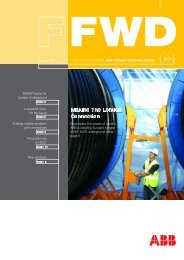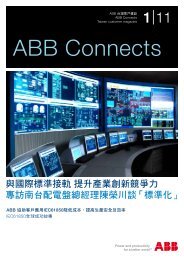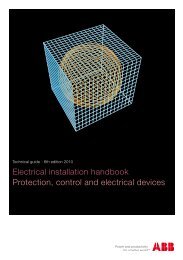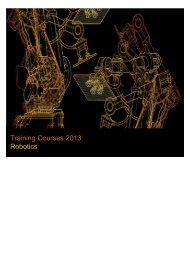ABB Review Special Report - ABB - ABB Group
ABB Review Special Report - ABB - ABB Group
ABB Review Special Report - ABB - ABB Group
- No tags were found...
Create successful ePaper yourself
Turn your PDF publications into a flip-book with our unique Google optimized e-Paper software.
Industrial ITand theutility industryClaes Rytoft, Bo Normark<strong>ABB</strong>’s Industrial IT has been discussed often in the pagesof <strong>ABB</strong> <strong>Review</strong>, and its benefits, especially for automation,manufacturing and production applications, have beenexplained in detail. But what about the utility industry?How is Industrial IT contributing to this important area of<strong>ABB</strong> business and how can the unique business environmentof the utility industry profit from it?The utility industry is undergoinga fundamental transformation. Thechange from a vertically integrated industry,often under national control andwith only limited competition, if any atall, to a fully competitive, deregulatedindustry is dramatic in all its implications.On top of all this, the product involved,electrical energy, is vital to thedevelopment of nations. The US Departmentof Energy has put this clearly intoperspective by stating:“Electricity is a cornerstone on whichthe economy and the daily lives of ournation’s citizens depend. This essentialcommodity has no substitute. Unlikemost commodities, electricity cannoteasily be stored, so it must be producedat the same instant it is consumed. Theelectricity delivery system must be flexibleenough, every second of the day andevery day of the year, to accommodatethe nation’s ever-changing demand forelectricity. There is growing evidencethat both private and public action isurgently needed to ensure our transmissionsystem will continue to meet thenation’s need for reliable and affordableelectricity in the 21st century.IT solutions will be a key area for utilitiesin this new and fast-changing market.Only IT solutions can successfullyprovide enough flexibility and intelligenceto accommodate changes in themarket such as price erosion, investmentuncertainty and demand for higherreliability.Price erosionThe introduction of competition has, inmost cases, led to significant reductionsin electricity prices, as in Europe, wherethe electric utility industry has beenundergoing restructuring for the last tenyears 1 .Industrial customers are usually the firstto benefit from increased competition.Subsequent opening of the individualconsumer market is accompanied bystrong pressure on electricity pricesacross the board; in Sweden more than30% of customers have changed theirelectricity supplier since reform wasintroduced just a few years ago.The consequences of the increasedcompetition are that the utilities haveto better utilize existing investments,which are very capital intensive, toenhance their value, and also ensure thehighest possible return on future investments.At the same time, operation andmaintenance costs are becoming morecritical.Investment uncertaintyIn a non-competitive environment,planners had only to consider the loadgrowth per region and structure theinvestments accordingly. The regulatoryframework and the customer base werestable and this made planning easy. Themain focus was on security of supply,and costs for investments, operation andmaintenance were simply passed on tothe consumer.With the unbundling of generation,transmission and distribution activities,totally new conditions were createdfor the utilities. Competition is normallyintroduced in the generation business,whereas transmission is often left regulated.Different models are applied todistribution, but as a rule the regulatorpressures the distributor to be com-<strong>Special</strong> <strong>Report</strong><strong>ABB</strong> <strong>Review</strong>37
















